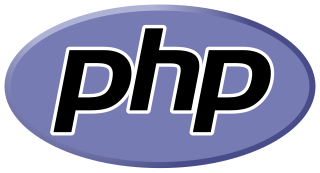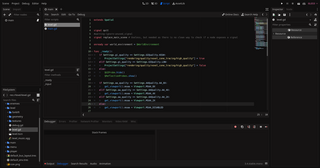Active Server Pages (ASP) is Microsoft's first server-side scripting language and engine for dynamic web pages.

Microsoft Access is a database management system (DBMS) from Microsoft that combines the relational Access Database Engine (ACE) with a graphical user interface and software-development tools. It is a member of the Microsoft 365 suite of applications, included in the Professional and higher editions or sold separately.

PHP is a general-purpose scripting language geared toward web development. It was originally created by Danish-Canadian programmer Rasmus Lerdorf in 1993 and released in 1995. The PHP reference implementation is now produced by The PHP Group. PHP was originally an abbreviation of Personal Home Page, but it now stands for the recursive initialism PHP: Hypertext Preprocessor.
VBScript is an Active Scripting language developed by Microsoft that is modeled on Visual Basic. It allows Microsoft Windows system administrators to generate powerful tools for managing computers without error handling and with subroutines and other advanced programming constructs. It can give the user complete control over many aspects of their computing environment.
Visual Basic for Applications (VBA) is an implementation of Microsoft's event-driven programming language Visual Basic 6.0 built into most desktop Microsoft Office applications. Although based on pre-.NET Visual Basic, which is no longer supported or updated by Microsoft, the VBA implementation in Office continues to be updated to support new Office features. VBA is used for professional and end-user development due to its perceived ease-of-use, Office's vast installed userbase, and extensive legacy in business.
In computing, cross-platform software is computer software that is designed to work in several computing platforms. Some cross-platform software requires a separate build for each platform, but some can be directly run on any platform without special preparation, being written in an interpreted language or compiled to portable bytecode for which the interpreters or run-time packages are common or standard components of all supported platforms.

ActiveX is a deprecated software framework created by Microsoft that adapts its earlier Component Object Model (COM) and Object Linking and Embedding (OLE) technologies for content downloaded from a network, particularly from the World Wide Web. Microsoft introduced ActiveX in 1996. In principle, ActiveX is not dependent on Microsoft Windows operating systems, but in practice, most ActiveX controls only run on Windows. Most also require the client to be running on an x86-based computer because ActiveX controls contain compiled code.
The Microsoft Windows Script Host (WSH) is an automation technology for Microsoft Windows operating systems that provides scripting abilities comparable to batch files, but with a wider range of supported features. This tool was first provided on Windows 95 after Build 950a on the installation discs as an optional installation configurable and installable by means of the Control Panel, and then a standard component of Windows 98 and subsequent and Windows NT 4.0 Build 1381 and by means of Service Pack 4. The WSH is also a means of automation for Internet Explorer via the installed WSH engines from IE Version 3.0 onwards; at this time VBScript became means of automation for Microsoft Outlook 97. The WSH is also an optional install provided with a VBScript and JScript engine for Windows CE 3.0 and following and some third-party engines including Rexx and other forms of Basic are also available.
Delphi is a general-purpose programming language and a software product that uses the Delphi dialect of the Object Pascal programming language and provides an integrated development environment (IDE) for rapid application development of desktop, mobile, web, and console software, currently developed and maintained by Embarcadero Technologies.
JScript .NET is a .NET programming language developed by Microsoft.
The Internet Server Application Programming Interface (ISAPI) is an N-tier API of Internet Information Services (IIS), Microsoft's collection of Windows-based web server services. The most prominent application of IIS and ISAPI is Microsoft's web server.
Active Scripting is the technology used in Windows to implement component-based scripting support. It is based on OLE Automation and allows installation of additional scripting engines in the form of COM modules.
ASP.NET AJAX, formerly called Atlas, is a set of extensions to ASP.NET developed by Microsoft for implementing Ajax functionality. It is released under the Microsoft Public License (Ms-PL).
In Microsoft Windows applications programming, OLE Automation is an inter-process communication mechanism created by Microsoft. It is based on a subset of Component Object Model (COM) that was intended for use by scripting languages – originally Visual Basic – but now is used by several languages on Windows. All automation objects are required to implement the IDispatch interface. It provides an infrastructure whereby applications called automation controllers can access and manipulate shared automation objects that are exported by other applications. It supersedes Dynamic Data Exchange (DDE), an older mechanism for applications to control one another. As with DDE, in OLE Automation the automation controller is the "client" and the application exporting the automation objects is the "server".

The original Visual Basic is a third-generation event-driven programming language from Microsoft known for its Component Object Model (COM) programming model first released in 1991 and declared legacy during 2008. Microsoft intended Visual Basic to be relatively easy to learn and use. Visual Basic was derived from BASIC and enables the rapid application development (RAD) of graphical user interface (GUI) applications, access to databases using Data Access Objects, Remote Data Objects, or ActiveX Data Objects, and creation of ActiveX controls and objects.
Visual Studio Tools for Office (VSTO) is a set of development tools available in the form of a Visual Studio add-in and a runtime that allows Microsoft Office 2003 and later versions of Office applications to host the .NET Framework Common Language Runtime (CLR) to expose their functionality via .NET.

A scripting language or script language is a programming language that is used to manipulate, customize, and automate the facilities of an existing system. Scripting languages are usually interpreted at runtime rather than compiled.

The Chromium Embedded Framework (CEF) is an open-source software framework for embedding a Chromium web browser within another application. This enables developers to add web browsing functionality to their application, as well as the ability to use HTML, CSS, and JavaScript to create the application's user interface.
Smart Pascal is a dialect of the Object Pascal computer language that is derived from Delphi Web Script, but is enhanced and adapted for Smart Mobile Studio, a commercial development suite that generates JavaScript rather than machine code.
ASP.NET Web Forms is a web application framework and one of several programming models supported by the Microsoft ASP.NET technology. Web Forms applications can be written in any programming language which supports the Common Language Runtime, such as C# or Visual Basic. The main building blocks of Web Forms pages are server controls, which are reusable components responsible for rendering HTML markup and responding to events. A technique called view state is used to persist the state of server controls between normally stateless HTTP requests.